Many people use lip balm to prevent or treat dry and chapped lips.
Chapped lips can be a real pain, especially in wintertime when the air is dry.
Tracking down lip balm that fits both criteria is no easy task, but that’s what our researchers have managed to do. Below, you’ll find our rankings of the ten best lip balms you can get your hands on.
1. Badger Unscented Classic Lip Balm
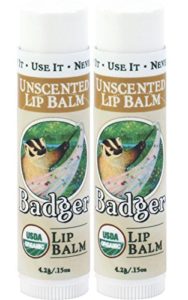
Click here for the lowest price on Amazon
It doesn’t get much simpler than this. Badger Unscented Classic has only four ingredients: virgin olive oil, beeswax, castor oil, and rosemary extract.
All of these ingredients are certified organic, and without any additives for flavor or scent, it’s the best choice if you have sensitive lips.
Unless you are very attached to the idea of a lip balm that is flavored or perfumed, there really aren’t any downsides to Badger Unscented Classic Lip Balm, making it the top pick.
2. Burt’s Bees Lip Balm
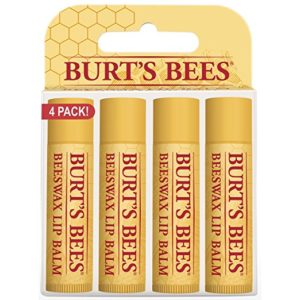
Click here for the lowest price on Amazon
A favorite of natural cosmetic enthusiasts everywhere, Burt’s Bees keeps their formulation simple but sophisticated.
As you’d guess from the name, the key ingredient in Burt’s Bees is beeswax, alongside coconut oil. Both provide great moisturizing power and protection to your lips.
Burt’s Bees is mildly flavored and scented with peppermint oil and rosemary leaf oil, and while people with hypersensitive lips may not react well to these ingredients or the wool-derived lanolin, it’s still tolerated very well by most people, making it one of our top picks.
3. EOS Lip Balm
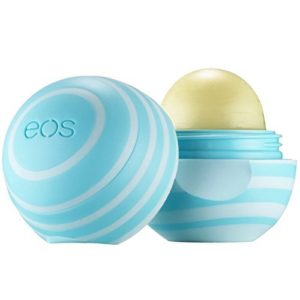
Click here for the lowest price on Amazon
Among the flavored lip balms, EOS is certainly the best. It comes in a variety of intense flavors and scents, but it accomplishes this while keeping true to its all-natural ingredient commitment.
Instead of artificial flavorings and colorings, EOS Lip Balm relies on plant-based ingredients like vanilla fruit extract and stevia.
It’s also got the excellent hydrating and healing properties of jojoba seed oil, beeswax, and shea butter oil, making its moisturizing and protection among the best.
4. ArtNaturals Natural Lip Balm
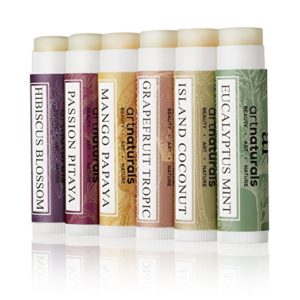
Click here for the lowest price on Amazon
ArtNaturals has an excellent lip balm line that uses quality hydrating and protecting agents like beeswax and coconut oil, as well as slightly more exotic skin salves like jojoba seed oil and aloe vera leaf extract.
This makes it a top pick for people who have cracking and splitting in addition to dried out areas on their lips. These ingredients will help soothe lips that are sunburned and damaged, while encouraging them to repair their damage.
5. Sky Organics USDA Organic Lip Balm
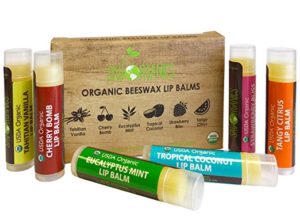
Click here for the lowest price on Amazon
Sky Organics offers a wide variety of flavors of their organic lip balm that keep thing simple. With the only ingredients being sunflower oil, beeswax, coconut oil, and a few other ingredients (all of them organic), Sky Organics’ lip balm is bound to be a favorite both among people with sensitive lips and among fans of all-natural products.
The hydrating and sealing power might not be completely top-notch, but this is balanced out by the antioxidant power of vitamin E, which can help encourage healing in damaged lips.
6. Maybelline Baby Lips
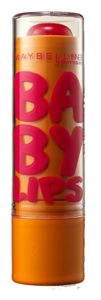
Click here for the lowest price on Amazon
Maybelline Baby Lips fills a unique role, which is a lip balm that can also function as a lipstick. Don’t let the bright colors and flavorings fool you; Maybelline Baby Lips still has some moisturizing and protecting power.
It does have to make some sacrifices to be able to fill these dual roles, but you can spot both shea butter and candelilla wax fairly high up in the ingredients, and both of these are great for hydrating and sealing lips.
In terms of absolute quality, it can’t measure up to a dedicated lip balm, but women looking for a lipstick alternative on dry, cold days have a great option in Maybelline Baby Lips.
7. O’Keeffe’s Cooling Lip Repair Lip Balm
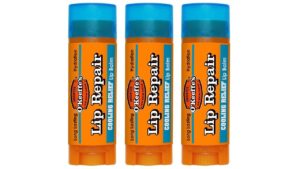
Click here for the lowest price on Amazon
O’Keefe’s offers an advanced formulation to help heal seriously chapped lips that have been damaged by dry air and repeated cracking.
The complex ingredients help protect the lips, seal in moisture, and encourage skin healing, though as with any other complex formulation, there will be an increased risk of adverse reactions on sensitive skin.
Another consequence of the way O’Keeffe’s Cooling Lip Repair is formulated is that the lip balm itself is quite runny–users complain that it’s hard to get an even coat on their lips.
8. Aquaphor Lip Protectant Plus Sunscreen

Click here for the lowest price on Amazon
You can think of Aquaphor Lip Protectant as vaseline plus some sunblock. It relies on petroleum distillates for its hydrating power, and it includes five different sun blocking ingredients to protect your lips from ultraviolet radiation.
Unfortunately, these include avobenzone and oxybenzone, two sunscreen ingredients that some consumer protection groups are worried about because of their potential toxicity.
Aquaphor isn’t a bad choice if you know you need the strong SPF protection of these sun blocking agents, but it’d be nice if they found a way to maintain the same sun blocking powers with a different set of ingredients.
9. Palmer’s Cocoa Butter Formula Lip Balm
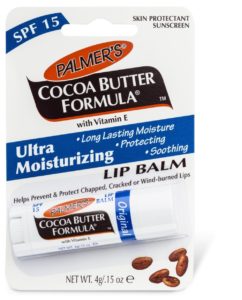
Click here for the lowest price on Amazon
Palmer’s Cocoa Butter Formula Lip Balm has some pretty solid hydrating ingredients, like its namesake cocoa butter, and on top of that,it provides SPF 15 protection from the sun, preventing your lips from getting sunburned.
It’d be nice if the active sunblock ingredients didn’t include oxybenzone; this compound is causing concern among environmental and health advocates because of the degree to which it’s absorbed by your body, and the fact that it may be able to mimic hormones while in your body and disrupt your endocrine system.
It would be easier to rank Palmer’s Cocoa Butter Formula Lip Balm higher if they’d used an alternative sun blocking compound.
10. Carmex Original Flavor
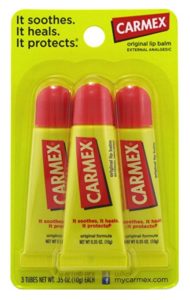
Click here for the lowest price on Amazon
While it’s a very popular solution to painfully dried lips, Carmex has a few ingredients working against its overall purpose.
What distinguishes Carmex from its competitors is its inclusion of menthol and camphor as pain-relieving agents, but the problem is that these chemicals can also have a drying and an aggravating effect on irritated skin.
If you love the cool, pain-relieving sensation you get from Carmex, it’s still an okay product, but even still, it doesn’t have quite the moisturizing power that you might like.
Part Two: Lip balm benefits and side effects
Dry air and cold weather can cause your lips to get chapped, cracked, and damaged. Once they’ve gotten this way, it’s very difficult to get them to heal without a lip balm.
The right lip balm can help rehydrate your skin and repair the protective barrier that’s supposed to stop your lips from losing their moisture to the air.
A quality lip balm has ingredients that both increase the water content of your lips and protect them from further damage.
Benefits
The main goal of using a lip balm is to seal in moisture, so to this end, any good lip balm will need quality moisturizers in it.
A 2005 article in the journal Skin Therapy Letter outlines the primary benefits of a number of moisturizers that you’ll see in high quality lip balms (1).
The article describes how a successful moisturizer functions, like a face moisturizer: first, it must rehydrate the skin. Then, it must repair the lipid layer that the external layer of skin or lip uses to retain moisture, and it has to stay in place long enough to substantially decrease the amount of water lost across this barrier throughout the day.
There are several different categories of moisturizers that are seen in lip balms. Emollients are compounds that increase the suppleness of the outer layer of skin, improving its resistance to damage.
A classic example of this that you’ll find in many lip balms is shea butter oil, which is a long saturated fat that helps restore the lip’s lipid layer and thus improves the ability of the lips to retain water. Other emollients that you’ll see include castor oil and glyceryl stearate.
Another category of moisturizer is an occlusive. These compounds form a thin barrier on the outside of your lips that prevents any additional water loss; it essentially acts like a replacement lipid layer.
Many lip balms include occlusives; some examples that you’ll often see in commercial products include petroleum jelly (also known as Vaseline), mineral oil, beeswax, and lanolin, a wool-derived compound.
Finally, some lip balms include humectants, which are compounds that attract water to the applied surface, usually from deeper layers of skin.
These do have a drawback, which is that without the additional protection of an occlusive or an emollient, a humectant can increase water loss from the lips, as it draws more water from deeper in the body out towards the surface.
But when combined with these other ingredients, humectants can be quite effective. Glycerin, honey, and propylene glycol are all different types of humectants that you might see in a lip balm product.
According to J.N. Kraft and C.W. Lynde at the University of Toronto, the authors of the Skin Therapy Letter paper, the ideal moisturizing agent is one which combines the benefits of emollients, occlusives, and humectants while delivering them in an acceptable consistency and texture.
In the context of lip balm, this means providing it in a stick or cream that’s not too firm and not too runny either. The consistency has implications beyond just ease of use; a lip balm that’s too stiff won’t be able to apply an even layer of moisturizer, and a lip balm that’s too runny won’t stay on your lips for very long.
Side Effects
Aside from moisturizing efficacy, the main obstacle to your success in finding a good lip balm is going to be how your skin reacts to the ingredients.
The best lip balms on the market are simple and straightforward; they use a small number of inert and often all-natural ingredients that are very unlikely to provoke any kind of negative reaction with your skin.
But if you find your lips burning, looking extra red, or peeling, you might be reacting poorly to your lip balm. The risk of this increases slightly if you are using a lip balm with a great many ingredients, like rare plant extracts or synthetic additives and perfumes.
Since it is inevitable that you’ll ingest a small amount of lip balm every time you apply it, it makes sense to stick to natural and simple formulations whenever possible.
A case series presented in the journal Dermatitis describes a classic case of poor tolerance to a lip balm (2).
The report describes four patients who came into a dermatology clinic with redness and a rash on their lips and the skin around their mouth.
All had been using lip balms, and the doctors conducted a series of tests to determine which ingredient was responsible for the adverse reaction. In all four cases, they identified peppermint oil to be the culprit. Now, not everyone is sensitive to peppermint oil–in fact, almost everyone is not–but this case series demonstrates that even fairly common ingredients can be responsible to an adverse reaction.
So, if your lips don’t tolerate a particular lip balm well, take a close look at the ingredients to see whether you can identify what the causal agent is.
Recap
When choosing a lip balm, look for a product that combines at least two of the three types of moisturizers: emollients, occlusives, and humectants.
Further, make sure that the lip balm is of an acceptable consistency, so you can apply a thin, even layer that will stay on and protect your lips for a long period of time.
If you know you have sensitive lips, look for a lip balm that has only a few ingredients, and avoid flavorings, herbal extracts, and other ancillary ingredients, as they all increase the chance (albeit slightly) of a negative reaction to a lip balm.
The right lip balm is the one that adequately protects your lips, plus has whatever other characteristics you desire, whether this means a pleasant taste and aroma, all-natural ingredients, or no skin sensitizing compounds.
https://bodynutrition.org/lip-balm/ http://bodynutritionorg.tumblr.com/post/170776990449
No comments:
Post a Comment